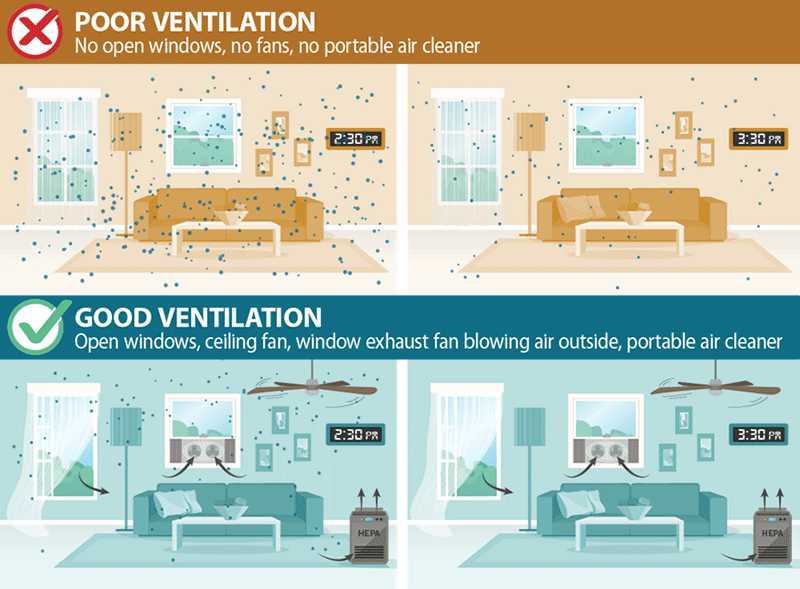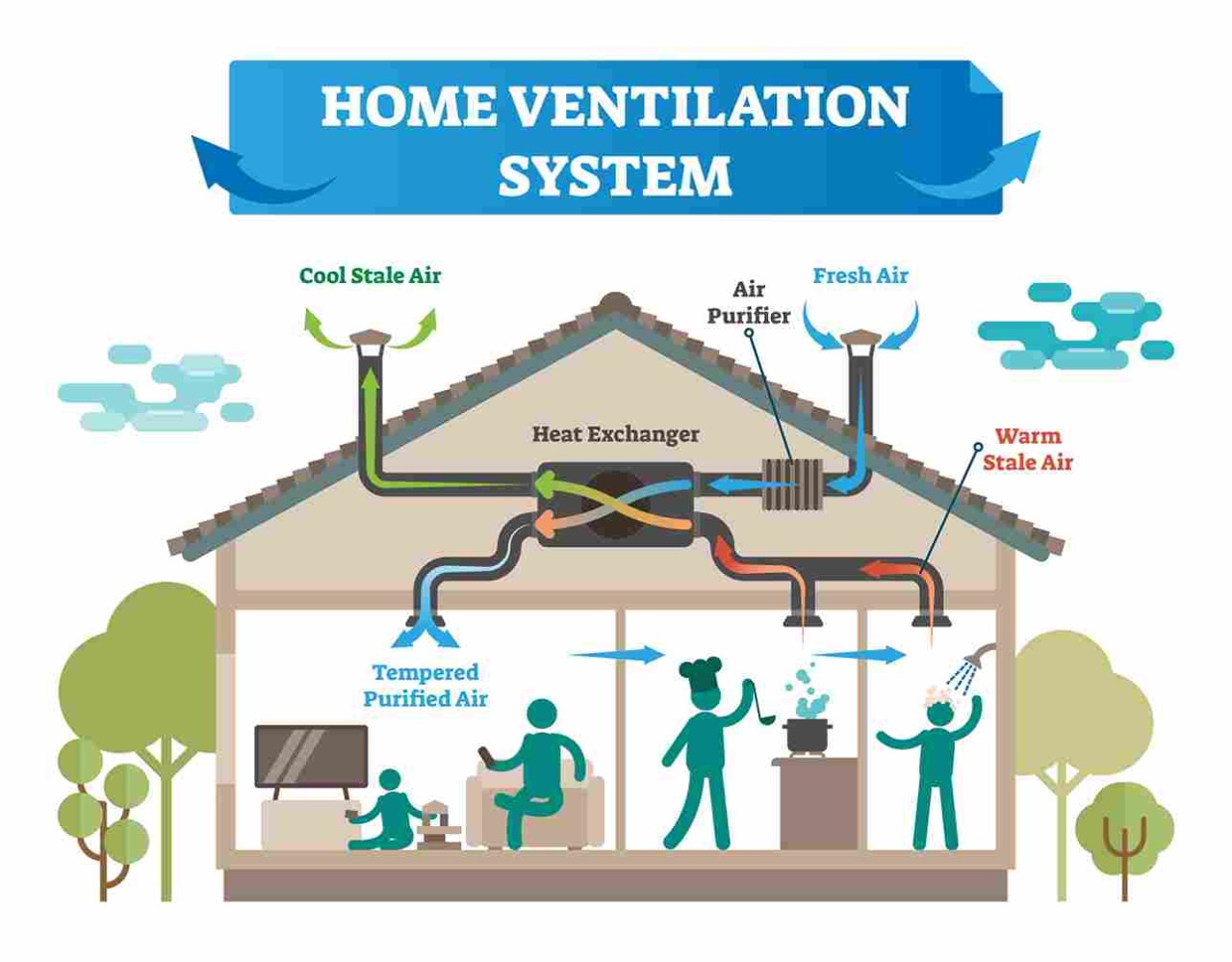The Complete Beginner’s Guide to Home Ventilation Melbourne
Wiki Article
The Role of Home Air Flow in Avoiding Mold And Mildew and Indoor Allergens
Home ventilation is a vital component in preserving a healthy indoor environment. It controls moisture levels, which can protect against the growth of mold and mildew and the accumulation of irritants. Numerous home owners ignore the importance of appropriate air flow, commonly leading to unseen issues. Recognizing how air flow systems feature and their influence on air top quality could be the secret to a much healthier living space. What actions can be taken to boost these systems properly?Comprehending Home Air Flow Systems
While lots of property owners might overlook the relevance of ventilation, comprehending home ventilation systems is crucial for maintaining indoor air high quality and protecting against mold and mildew development - Home Ventilation Melbourne. These systems help with the exchange of stagnant interior air with fresh exterior air, properly reducing pollutants and moisture levels. Typical types include all-natural air flow, which counts on wind and temperature differences, and mechanical ventilation, which utilizes ducts and fans to control airflow. Additionally, balanced ventilation systems combine both methods to optimize air quality. Correctly developed and maintained ventilation systems can help manage temperature and moisture, ensuring a comfy living setting. Home owners need to take into consideration variables like home format, environment, and occupancy when picking an air flow system to finest suit their needs and boost general air high quality
The Influence of Humidity on Mold And Mildew Development
Humidity plays a critical function in mold development, making it a crucial variable for home owners to keep an eye on. Mold prospers in environments where moisture levels surpass 60%, as these conditions supply the moisture needed for spores to germinate and multiply. High humidity can result from numerous sources, consisting of poor ventilation, water leakages, and cooking or bathing tasks. When humidity levels continue to be elevated, mold and mildew can create quickly on natural products such as timber, fabric, and drywall. Homeowners must utilize dehumidifiers and guarantee appropriate air flow in locations prone to moisture, such as basements and washrooms. Keeping interior moisture between 30% and 50% can considerably minimize the threat of mold growth, contributing to a healthier living atmosphere.Recognizing Usual Indoor Allergens
Indoor environments can harbor a range of irritants that influence health and comfort. Typical interior irritants consist of dirt mites, pet dander, mold spores, and plant pollen. Dirt termites grow in bed linens, carpetings, and upholstery, eating natural product and go now adding to respiratory system concerns. Family pet dander, composed of small flakes from skin and fur, can set off sensitive reactions in sensitive individuals. Mold spores, commonly existing in moist areas, can proliferate and influence air quality. In addition, pollen can penetrate homes with open windows or on garments. Recognizing these allergens is important for preserving a healthy and balanced indoor setting. Awareness of their presence allows property owners to take proactive measures to decrease exposure and enhance overall indoor air quality.Benefits of Appropriate Air Flow
Appropriate ventilation is necessary for maintaining a healthy interior setting, as it aids to control air quality and lower the accumulation of contaminants. Sufficient air flow facilitates the exchange of interior and outdoor air, consequently watering down unsafe compounds such as unpredictable organic compounds, irritants, and dirt. This procedure not only boosts comfort yet additionally contributes to the overall well-being of owners by minimizing respiratory concerns (Home Ventilation Melbourne). Proper ventilation successfully manages moisture degrees, decreasing the likelihood of mold and mildew growth and cultivating a drier atmosphere helpful to health and wellness. In addition, it can enhance power performance by making certain that heating & cooling systems run better, resulting in lower power prices. On the whole, correct ventilation is a critical element in promoting a healthy and balanced and risk-free home

Tips for Improving Home Ventilation
Lots of home owners may neglect it, boosting home air flow is vital for boosting air high quality and protecting against mold and mildew development. One effective approach is to on a regular basis open windows to advertise cross-ventilation, allowing fresh air to distribute. Mounting exhaust fans in bathroom and kitchens can successfully get rid of moisture-laden air, decreasing humidity levels. Homeowners need to additionally think about making use of air cleansers with HEPA filters to capture toxins and allergens. Frequently maintaining HVAC systems, consisting of transforming filters, guarantees come to a head air movement and effectiveness. Securing leaks around home windows and doors can protect against outside air from getting in, which helps maintain a regular indoor environment. Incorporating houseplants can normally boost air top quality while including visual worth to the home.Regularly Asked Inquiries
Exactly how Usually Should I Tidy My Home Ventilation System?
Identifying exactly how commonly to clean up a home air flow system depends upon different factors, consisting of usage and ecological conditions. Home Ventilation Melbourne. Typically, experts suggest an extensive cleaning every 3 to five years to maintain ideal airflow and effectivenessCan Plants Aid Minimize Indoor Allergens?
Research shows that specific indoor plants may help decrease irritants by enhancing air quality and enhancing moisture. However, their efficiency differs, and maintaining a clean setting continues to be vital for taking care of interior allergens successfully.What Sorts Of Air Filters Are Finest for Mold Prevention?

Are There Specific Ventilation Requirements for Cellars?

Just how Do I Know if My Ventilation Is Functioning Efficiently?
To figure out reliable ventilation, one ought to keep an eye on moisture degrees, check air flow with vents, and observe indicators of condensation or stationary air. Regular evaluations can suggest whether the system sufficiently flows and exchanges interior air.Understanding how ventilation systems function and their effect on websites air high quality can be the trick to a much healthier living room. While many property owners may forget the importance of ventilation, understanding home ventilation systems is necessary for keeping interior air top quality and preventing mold and mildew development. Usual kinds consist of natural ventilation, which depends on wind and temperature differences, and mechanical ventilation, which utilizes followers and air ducts to manage air flow. Appropriate ventilation is important for preserving a healthy indoor environment, as it aids to manage air top quality and minimize the accumulation of pollutants. Several property owners may overlook it, boosting home air flow is vital for improving air quality and preventing mold and mildew development.
Report this wiki page